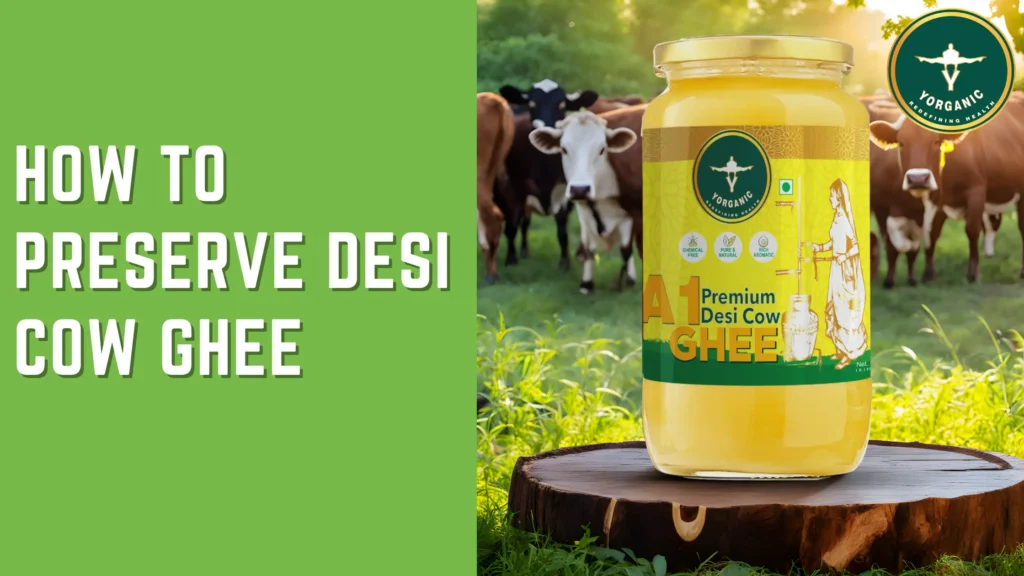Ghee is more than just clarified butter—it’s a treasured ingredient in Indian households and Ayurvedic medicine. But not all ghee is created equal. In today’s fast-paced world, processed ghee has become the norm, stripping away the nutritional and medicinal value that traditional ghee offers.
Enter A2 ghee, the gold standard of traditional wellness. But what exactly makes A2 ghee superior? Let’s compare traditional vs. processed ghee and see why A2 ghee truly wins every time.
Table of Contents
ToggleWhat is Traditional A2 Ghee?
Traditional A2 ghee is made from the milk of native Indian cows like Gir, Sahiwal, and Tharparkar. The process follows the bilona method—hand-churning curd made from A2 milk and slowly simmering the butter to extract pure ghee.
This artisanal approach:
1. Retains essential nutrients
2. Enhances digestibility
3. Produces a rich aroma and grainy texture
What is Processed Ghee?
Processed ghee is typically made on a mass scale using:
1. Milk cream from hybrid or crossbred cows (mostly A1 protein)
2. Industrial machines instead of traditional methods
3. High-temperature processing that can degrade nutrients
4. Additives or preservatives to extend shelf life
While it may look similar, the nutritional value and health impact differ significantly.
Traditional A2 Ghee vs. Processed Ghee: The Key Differences
| Feature | Traditional A2 Ghee | Processed Ghee |
|---|---|---|
| Source | Desi cows with A2 protein | Crossbred cows with A1 protein |
| Method | Bilona (curd-churning) | Industrial cream-based processing |
| Nutrient Retention | High – retains vitamins & butyrate | Low – many nutrients are degraded |
| Digestibility | Easily digestible, gut-friendly | Harder to digest, may cause bloating |
| Additives/Preservatives | None – pure and natural | Often added for shelf life |
| Ayurvedic Benefits | Strong – balances doshas, detoxifies | Minimal to none |
Why A2 Ghee Wins Every Time
1. Rich in Butyric Acid
Traditional A2 ghee contains more butyric acid, a short-chain fatty acid that promotes gut health, reduces inflammation, and strengthens immunity.
2. Free from Harmful A1 Protein
Most processed ghee is made from A1 milk, which some studies link to digestive discomfort and inflammation. A2 ghee contains only A2 beta-casein, which is gentler on the stomach.
3. No Chemical Processing
Traditional A2 ghee is free from additives, preservatives, or synthetic flavoring—just pure, natural goodness.
4. Superior Taste and Aroma
The slow-cooked, hand-crafted process of A2 ghee gives it a rich, nutty flavor and signature grainy texture that industrial ghee can’t replicate.
5. Ayurvedic Approval
A2 ghee has been used for centuries in Ayurveda to:
Balance vata, pitta, and kapha
Promote detoxification
Nourish tissues and boost longevity
Conclusion
In the battle between traditional and processed ghee, A2 ghee is the clear winner. Made the way nature intended—from desi cows, using ancient methods—A2 ghee is more than a cooking fat. It’s a superfood that nourishes your body, supports your gut, and elevates your wellness.
So the next time you shop for ghee, go beyond labels. Choose authentic A2 ghee and bring home centuries of tradition in a jar.
A2 ghee is made from milk of desi cows in smaller quantities using the slow bilona method, making it costlier but much higher in quality and nutrition.
Absolutely! A2 ghee has a high smoke point and can be used for sautéing, frying, baking, or even as a spread.
Check for certification, breed of cow (e.g., Gir or Sahiwal), and whether the bilona method is used. Look for transparent brands that list sourcing methods.
Yes. A2 ghee is highly nutritious and supports brain development in kids and joint health in older adults.
While it still provides fats and calories, processed ghee lacks the full spectrum of nutrients, digestibility, and Ayurvedic benefits found in traditional A2 ghee.





